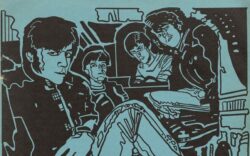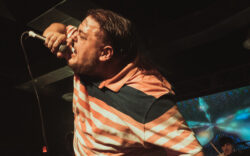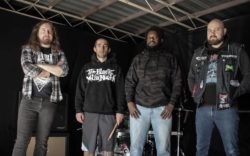In German, “stunde null” translates to “zero hour.” In the lexicon of 20th Century music, it refers to the awakening of Germany’s collective subconscious that culminated with krautrock. The late 1960s and early ’70s were marked by political upheaval. Young musicians rebelled against their parents’ generation, who seemed to live in denial of the World War II atrocities they had enabled. A young generation of Germans craved a new cultural identity that stood apart from American and British blues and rock influences. Finding their way amid the tumult of post-war Germany, the members of Faust personified the cultural imperative to express themselves in radically different ways.
Across the country, artists honed powers of improvisation, electronics, repetition and minimalism, forming groundbreaking acts such as Can, Tangerine Dream, Neu, Kraftwerk and others. In the end, no group was more feral or daring than Faust. The group set a high-water mark for unrestrained musical experimentation that coalesced into psychedelic rhythms and ambient textures.
“We were in the eye of a cyclone,” says the group’s frontman and multi-instrumentalist Jean-Hervé Péron via email. “We did not consciously realize what we—and all the other bands—were propagating.”
In 1971 Péron, along with Werner “Zappi” Diermaier, Hans Joachim Irmler, Arnulf Meifert, Gunther Wüsthoff and Rudolf Sosna, formed Faust in the Wümme countryside near Hamburg. According to legend, Polydor Records charged producer Uwe Nettelbeck with the task of finding Germany’s electronic answer to the Beatles. He returned with Faust, a group that didn’t quite fit the bill, but was certainly onto a revolution.
The group’s self-titled 1971 debut arrived as an audio collage of musique concrète, tape edits and Dadaism. The subtly jarring presence of opening number “Why Don’t You Eat Carrots” was perceived as one of the strangest pieces of German music at the time, and the LP was a commercial failure. But, as Péron says, “It was a stone in calm waters.”
Time has revealed Faust’s debut to be an enduring document of the outrageous creative spirit of the era and a flashpoint for the group’s legacy. More albums followed, including a 1972 collaboration with early minimalism luminary Tony Conrad, Outside the Dream Syndicate—an album that features a single tone and beat played for an hour. Other creative peaks, such as 1973’s Faust Tapes and 1995’s Rien, brandish industrial rhythms counterweighted by pastoral psychedelic rock, putting the group’s anarchic essence on full display.
But it is 1973’s Faust IV that captures the group’s true personality. As the warped wash of tape noise and flowing guitar distortion settles into the bucolic resonance of opening number “Krautrock,” a playful but subversive hand guides the music.
The term “krautrock” was initially lobbed by the British press as an insult pointed at German bands. In the early ’70s, the UK still held a grudge for World War II. But the pejorative intent of such name-calling gave way to an utterly utilitarian handle for the music.
“I don’t mind the term ‘krautrock’ any more than I mind ‘French fries,’ ‘Hoover’ or ‘unkaputtbar,’” Péron says. “They are part of the modern cultural wasteland. Being quite ironic at the beginning, it developed into an academic genre, so what the hell. We thought, ‘They call it krautrock, so let’s play krautrock.’”
Over the years, Faust has gone through various permutations. Earlier this month, the group embarked on the “faUSt alive” tour. Each night Péron takes the lead on bass and vocal duties, and is joined by fellow founding member and percussionist Diermaier and French cohort Maxime Manac’h (keyboard, hurdy-gurdy and percussion). Local artists are invited to collaborate, which dictates the direction for the performance.
Such collaborative efforts are nothing new for Faust. The group has appeared on records with audio collage artist Nurse With Wound and avant-garde hip hop act Dälek, and 2013’s JUSt was partially designed so other musicians could sample and build the album to make their own sounds.
For this tour, the setlist is written shortly before the show begins. The group delves into older material and new songs, tied together by a flourishing strain of improvisation, an essential part of Faust’s repertoire. “Improvising is possibly the hardest way to create art—here music—as you are left naked at the very moment of creation,” Péron says. “Obviously, in the run of 45 years, things and people have changed. Although I know Zappi’s mood and twists of spirit fairly well, it remains a challenge to spontaneously collaborate with any artist.”
After 45 years, Péron and Diermaier still dwell in the eye of a cyclone, drawing in unsuspecting locals to fuel their seemingly endless imperative to express themselves in radically different ways.
Like what you just read? Support Flagpole by making a donation today. Every dollar you give helps fund our ongoing mission to provide Athens with quality, independent journalism.










